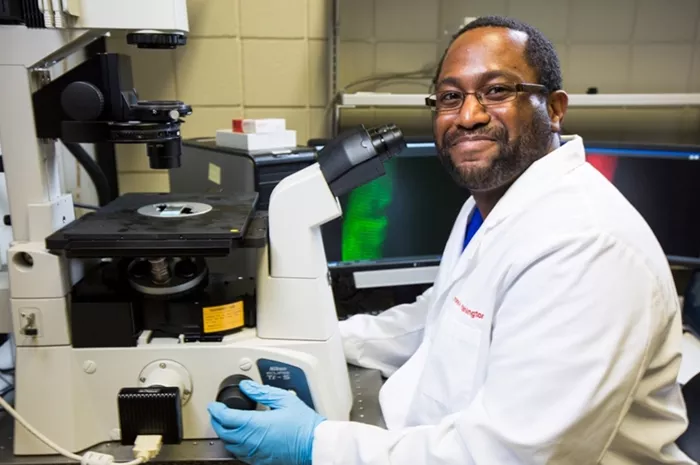Severe injuries such as those sustained on the battlefield, in car accidents, or during certain surgical procedures like tumor removal can lead to volumetric muscle loss, a condition where the muscle damage is so extensive that full recovery is nearly impossible. This type of trauma can leave patients with long-term functional impairments, greatly reducing their quality of life.
In a significant step forward for research in this field, Tyrone Washington, an associate professor of exercise science at the University of Arkansas’ College of Education and Health Professions, has been awarded a $434,793 R15 grant from the National Institutes of Health (NIH). The three-year grant will support his efforts to enhance recovery from severe muscle injuries.
Washington, who has been investigating skeletal muscle regeneration since 2001, serves as the principal investigator on this project. He will be joined by co-investigators Nicholas Greene and Kevin Murach from the exercise science department, as well as Jeff Wolchok, the head of the biomedical engineering department. The project will also provide valuable hands-on research experience for students, preparing them for careers in high-level biomedical research.
“Securing this NIH grant is a remarkable milestone that fuels my ongoing passion for studying skeletal muscle regeneration,” Washington said. “This project allows us to push the boundaries of current recovery methods and explore new possibilities in regenerative medicine.”
Washington’s interest in volumetric muscle loss was piqued in 2011, thanks to a chance meeting with Wolchok at a chancellor’s dinner for new faculty members. Wolchok introduced Washington to the devastating effects of volumetric muscle loss, where traditional treatments typically result in only about 80 percent of muscle force recovery, leaving patients with significant long-term disabilities.
Together, Washington and Wolchok have been exploring innovative strategies to improve recovery outcomes, combining surgical interventions with physical exercise to surpass the current limitations in treatment. The NIH grant will allow them to further develop these approaches, with the ultimate goal of improving long-term physical function for those who have suffered from severe muscle injuries.
Washington’s journey into muscle regeneration research began as a graduate student under the mentorship of James Carson, now the director of the Huffines Institute for Sports Medicine and Human Performance at Texas A&M University. Carson’s work on muscle plasticity—how muscles can change in response to different conditions—deeply influenced Washington’s career. His dissertation focused on the role of inflammatory cytokine interleukin-6 (IL-6) in muscle hypertrophy and regeneration, laying the groundwork for his current research.
Carson expressed pride in Washington’s accomplishments, noting that securing NIH funding is no small feat. “Seeing Tyrone receive this grant is incredibly rewarding,” Carson said. “As one of my earliest students, he took a chance on me as a new professor, and it’s gratifying to see how far he’s come. This NIH grant is a testament to his dedication and the impact of his research.”
Nicholas Greene, director of the University of Arkansas Exercise Science Research Center, echoed Carson’s sentiments. “In the world of biomedical research, NIH funding is a benchmark of success,” Greene said. “Tyrone has worked tirelessly to build his research program and has been an outstanding mentor to both undergraduate and graduate students. This grant is a well-deserved recognition of his hard work and commitment to advancing the field.”
With the support of this NIH grant, Washington and his team are poised to make significant strides in the understanding and treatment of traumatic muscle injuries, offering hope for improved recovery and quality of life for those affected by these devastating conditions.
Related articles:
UCL Study Highlights Evolving Impact of Cardiovascular Health on Dementia Risk
Escalating Heat-Related Deaths In The U.S.: An Urgent Public Health Crisis
Madison Keys Reflects On The US Open, Health Management, And A New Definition Of Succe


